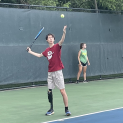3-D Printed Self-fitting Shape Memory Bone Grafts for Smart Pediatric Skeletal Reconstruction

Background
More than half of all new cases of osteosarcoma in the United States occur in children and adolescents, and they account for 2% of all childhood cancers. Surgical resection of osteosarcoma can be highly effective in improving the odds of a complete cure, but conventional bone grafting suffers from unstable graft fixation, safety risks associated with high-dose adjuvant bone morphogenetic protein (BMP) therapeutics and slow graft resorption/inadequate osteointegration. Pediatric cancer patients are particularly impacted by these limitations due to their active lifestyles, growing skeletons susceptible to structural perturbations and vulnerability to high-dose osteogenic therapeutics including risks for cancer recurrence.
We have developed a class of 3-D printed biodegradable shape memory synthetic bone grafts that are capable of smart self-fixation within skeletal defects under physiological conditions and can template robust bone formation with or without an extremely low dose of BMP therapeutics.
Project Goal
This study tests the efficacy of this biomaterial platform in guiding effective regenerative reconstruction of weight-bearing long bone and mandibular defects using clinically relevant rodent skeletal defect models. A successful outcome of this study will translate into safer and far more effective skeletal/craniomaxillofacial reconstruction for pediatric cancer patients suffering from osteosarcoma, spinal cord cancer, oral cancer or cancer metathesis to the skeleton.
Project Update - June 2020
More than half of the new cases of bone tumors in the U.S. occur in children and adolescents, and complete surgical resection is the most effective treatment option. However, failed skeletal reconstruction following tumor resection due to unstable graft fixation and/or inadequate osteointegration compromises the quality of life of pediatric cancer patients. Additionally, the current strategy for enhancing graft osteointegration via the use of bone morphogenetic proteins (BMPs) results in significant health complications including risks for cancer recurrence due to the exceptionally high clinical doses and their burst release from commercial carriers. In year 1, we developed 3-D printed resorbable shape memory bone grafts and demonstrated their convenient delivery to long bone defects in small animals, which resulted in stable graft fixation (100% success rate). The graft facilitated the rapid regeneration of long bone while degraded in a safe and timely manner, resulting in the full restoration of the mechanical function of the regenerated bone. Importantly, we accomplished this with an exceptionally low dose of BMPs (>100 times lower than commonly required using conventional carrier), which could translate into enhanced efficacy and safety for pediatric cancer patients.

